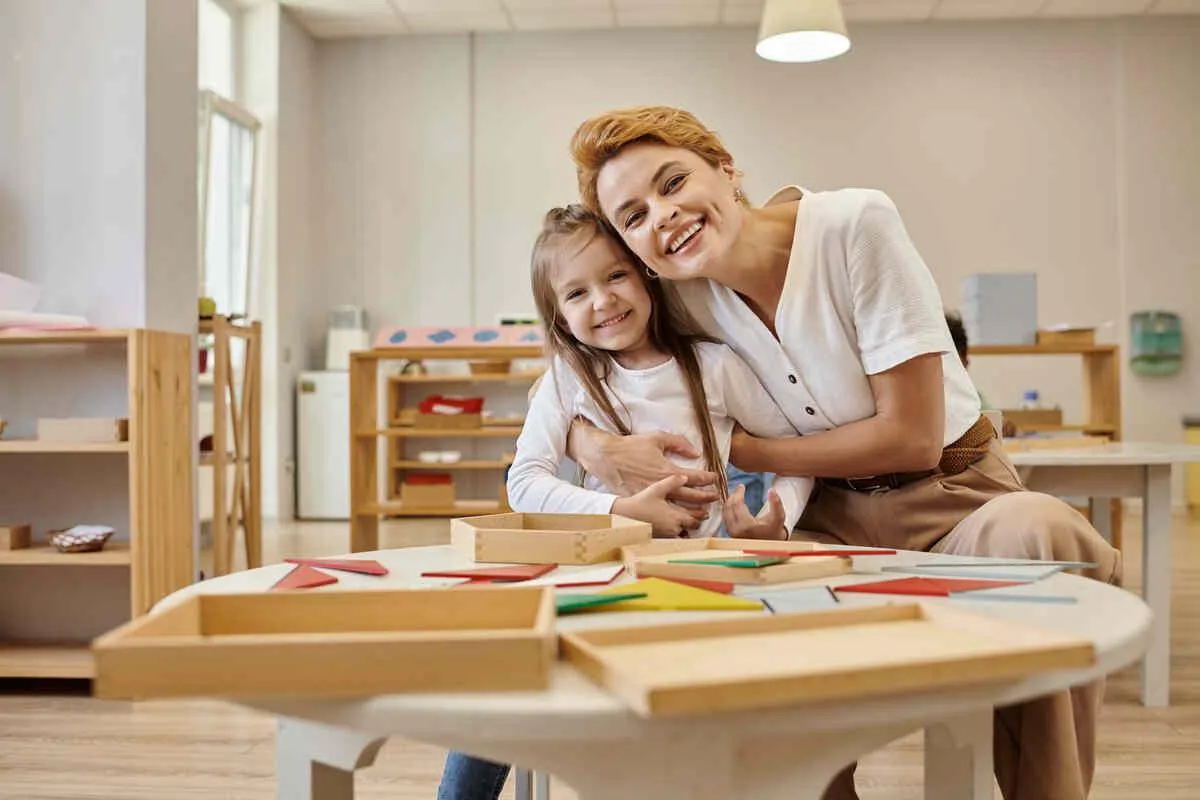Blogs and Articles
Welcome to the Sugar n Spice Daycare Center and Kindergarten blog! This is a place where parents can find helpful tips and advice on a variety of parenting topics, including early childhood development, child behavior, and parenting hacks. We also share articles about our daycare program and the events and activities that we offer.
Whether you're a new parent or a seasoned pro, we hope you'll find something useful on our blog. Please feel free to leave comments and share your own parenting tips with us. We're always learning new things, and we love hearing from our readers.

7 Questions to Ask Your Child's Kindergarten Teacher
Why Asking Questions to Your Child’s Kindergarten Teacher is Crucial
Starting kindergarten is a significant milestone for both you and your child. It marks the beginning of formal education and sets the foundation for years. As a parent, you naturally want to ensure your child is in a supportive and nurturing environment that fosters growth, learning, and creativity. One of the best ways to do this is by asking the right questions to your child’s kindergarten teacher.
A strong partnership between parents and teachers can make a tremendous difference in a child’s education. The beginning of the school year is the perfect time to connect with your child’s kindergarten teacher and establish open lines of communication. By staying informed and involved, you can help your child thrive in their new kindergarten classroom.
Let’s explore seven essential questions you should ask your child’s kindergarten teacher to ensure a successful start to their educational journey.
1. How is Creativity and Innovative Thinking Promoted in the Classroom?
Creativity is a vital part of a child’s development. It encourages problem-solving, critical thinking, and the ability to approach situations from different perspectives. In a kindergarten center, fostering creativity can significantly enhance your child’s learning experience.
When you ask this question, you’re showing that you value an environment where your child’s imagination can flourish. It’s essential to know how the kindergarten teacher integrates creative activities into the daily routine. Do they incorporate art projects, imaginative play, or open-ended questions that inspire curiosity?
Why It Matters: Creativity isn’t just about arts and crafts. It’s about allowing children to explore ideas, ask questions, and think outside the box. A teacher who prioritizes creativity will help your child develop the confidence to express themselves and explore their interests.

2. How is Learning Personalized in the Classroom?
Every child is unique, with different strengths, challenges, and learning styles. Personalized learning is about recognizing these differences and adapting teaching methods to meet each child’s needs. In a kindergarten classroom, this could mean offering different types of activities for different learning styles or providing additional support where needed.
By asking this question, you’re emphasizing the importance of an inclusive approach to education. You want to ensure that your child’s teacher is aware of and responsive to your child’s individual needs.
Why It Matters: Personalized learning helps ensure that no child is left behind. It allows the kindergarten teacher to challenge students who are ready to advance while providing extra help to those who may struggle with certain concepts. This approach promotes a more balanced and effective learning environment.
3. What is Your Approach to Teaching Social-Emotional Skills?
Social-emotional learning (SEL) is just as important as academic learning, especially in a kindergarten setting. These skills help children manage their emotions, build relationships, and make responsible decisions. Asking about the kindergarten teacher’s approach to SEL will give you insight into how they handle classroom dynamics and conflicts.
Inquiring about this topic shows that you understand the importance of emotional well-being in your child’s overall development. It’s important to know how the teacher helps children develop empathy, resilience, and cooperation.
Why It Matters: Social-emotional skills are the foundation for a child’s success both in and out of the classroom. A teacher who focuses on SEL will create a supportive environment where children feel safe to express themselves and learn how to interact positively with others.

4. What Are the Key Learning Goals for This Year?
Every kindergarten center has a curriculum with specific learning goals that guide the year’s activities. Understanding these goals helps you align your expectations and support your child’s learning at home. This question is crucial because it gives you a clear picture of what your child will be working toward and how progress will be measured.
Knowing the key learning goals allows you to reinforce what’s being taught in the classroom and stay involved in your child’s academic development. It also provides an opportunity to discuss any concerns you might have regarding your child’s readiness to meet these goals.
Why It Matters: Clear learning goals help both parents and children stay focused on what’s important throughout the school year. They provide a roadmap for academic growth and ensure that your child is on track to meet essential milestones.
5. How Will the Classroom Environment Be?
The environment of a kindergarten classroom plays a significant role in how children learn and interact. A well-organized, safe, and stimulating environment can enhance learning and make children feel comfortable and eager to participate. When you ask this question, you’re seeking to understand how the physical space will support your child’s learning and well-being.
The classroom environment includes everything from the layout and materials available to the daily schedule and routines. It’s important to know if the classroom is designed to promote independence, creativity, and collaboration.
Why It Matters: A thoughtfully designed classroom environment can foster a sense of security and belonging, which is essential for young children as they adjust to a new setting. It also influences how children engage in learning activities and with each other.

6. What Are the Homework Expectations and Overall Classroom Success?
Homework in kindergarten might seem minimal, but it plays an important role in reinforcing what’s learned in the classroom. Understanding the teacher’s expectations for homework and overall classroom success will help you support your child’s learning outside of school.
This question helps you gauge how much time you’ll need to dedicate to helping your child with schoolwork and how you can best support their academic progress. It’s also an opportunity to discuss how success is defined and measured in the kindergarten classroom.
Why It Matters: Knowing the homework expectations allows you to create a routine at home that complements what your child is learning at school. It also ensures that you’re aware of how your child’s progress will be tracked and how you can contribute to their success.
7. How Do You Reward My Child’s Good Behavior?
Positive reinforcement is a powerful tool in early childhood education. It encourages children to repeat good behavior by rewarding them when they do something well. Understanding how your child’s kindergarten teacher uses rewards in the classroom will give you insight into how they manage behavior and motivate students.
When you ask this question, you’re showing that you value a positive and supportive classroom environment. You want to know how good behavior is acknowledged and whether the rewards are meaningful and consistent.
Why It Matters: Rewards and recognition can significantly impact a child’s behavior and self-esteem. A teacher who uses positive reinforcement effectively will help children understand the benefits of good behavior and build their confidence in their abilities.

Preparing Your Child for Kindergarten: What to Expect
Starting kindergarten can be an exciting yet challenging time for your child. To help ease the transition, it’s important to prepare them for what to expect. Here are a few tips:
Talk About the School Routine: Discuss the daily routine with your child, so they know what to expect, including the structure of the kindergarten classroom and the role of the kindergarten teacher.
Visit the School Together: If possible, visit the kindergarten center before the first day of school. Familiarizing your child with the new environment can reduce anxiety and help them feel more comfortable.
Practice Independence: Encourage your child to practice skills like dressing themselves, using the restroom independently, and following simple instructions. These are all important for success in a kindergarten classroom.
Build Excitement: Talk positively about school and the new friends they will make. Building excitement can help your child feel more eager to start this new chapter.
Conclusion
Asking the right questions can make a significant difference in your child’s kindergarten experience. By understanding the kindergarten teacher’s approach to creativity, personalized learning, social-emotional development, and more, you can better support your child’s growth and ensure they have a positive start to their education. Remember, a strong parent-teacher partnership is key to your child’s success. To learn more or to discuss your child’s needs, don’t hesitate to contact Sugar N Spice Day Care & Kindergarten at (205) 822-8581.
2026 © Sugar N Spice Day Care & Kindergarten, LLC, All rights reserve
Privacy Policy | Terms and Conditions
Powered by Kyrios Systems
